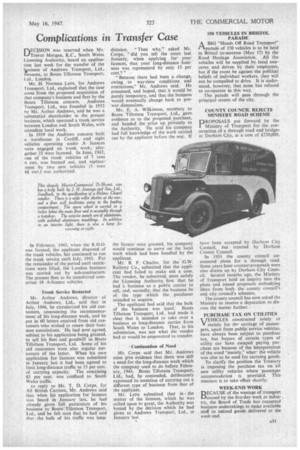Complications in Transfer Case
Page 33

If you've noticed an error in this article please click here to report it so we can fix it.
DECISION was reserved when Mr.L./Trevor Morgan, KC., South Wales Licensing Authority, heard an application last week for the transfer of the 4tsiness of Andrews Transport, Ltd., Swansea, to Bouts Tillotson Transport, Ltd., London.
Mr. H. Norman Letts, for Andrews Transport, Ltd., explained that the case arose from the proposed acquisition of that company's business and fleet by the Bouts Tillotson concern. Andrews Transport, Ltd., was founded in 1932 by Mr. Arthur Andrews, and he was a substantial shareholder in the present business, which operated a trunk service between London and South Wales, with attendant local work.
In 1939 the Andrews concern built a warehouse in Cardiff, and eight vehicles operating under A licences were engaged on trunk work; altogether 23 were licensed. In June, 1942, one of the trunk vehicles of 7 tons 6 cwt. was burned out, and replacement by two new vehicles (5 tons 6f cwt.) was authorized.
In February, 1943, when the R.H.O. was formed, the applicant disposed of the trunk vehicles, but continued to run the trunk service until July, 1943. For the remainder of the period until restrictions were lifted, the London business was carried out by sub-contractors. The present fleet to be transferred comprises 18 A-licence vehicles.
Trunk Service Restarted Mr. Arthur Andrews, director of Arthur Andrews, Ltd., said that in July, 1946, he circularized his old customers, announcing the recommencement of his long-distance work, and he put in 60 letters received from old customers who wished to renew their business associations, lie had now agreed, subject to his application being granted, to sell his fleet and goodwill to Bouts Tillotson Transport, Ltd. Some of his old customers were also regular customers of the latter. When his own application for licences was submitted in January last it had been agreed to limit long-distance traffic to 15 per cent. of carrying capacity. The remaining 85 per cent, was confined to South Wales traffic.
In reply to Mr. T. D. Corpe, for All British Carriers, Mr. Andrews said that when his application for licences • was heard in January last, he had already given full particulars of his business to Bouts Tillotson Transport, Ltd., and he felt sure that he had said that the bulk of his traffic was long distance. "Then why," asked Mr. Corpe, "did you tell the court last January, when applying for your licences, that your long-distance business was represented by only 15 per cent.?"
"Because there had been a change, owing to war-time conditions and restrictions," Mr. Andrews said. He presumed, and hoped, that it would be purely temporary, and that the business would eventually change back to prewar dimensions.
Mr. E. A. Wilkinson, secretary to Bouts Tillotson Transport, Ltd., gave evidence as to the proposed purchase, and handed the price up privately to the Authority. He said his company had full knowledge of the work carried out by the applicant before the war. If the licence were granted, his eompany would continue to carry on the local work which had been handled by the applicant.
Mr. B. P. Charles, for the G.W. Railway Co., submitted that the applicant had failed to make out a case. The vendor, he submitted, must satisfy the Licensing Authority first that he had a business as a public carrier to sell, and, secondly. that the business be of the type which the purchaser intended to acquire.
The applicant had said that the bulk of the business was local. Bouts Tillotson Transport, Ltd.. had made it clear that it intended to take over a business as long-distance carrier from South Wales to London. That, in his submission, was not what the vendor had or would be empowered to transfer.
Continuation of Need Mr. Corpe said that Mr. Andrews must give evidence that there was still a need for the long-distance work which the company used to do before February, 1943. Bouts Tillotson Transport, Ltd., had, he contended, deliberately expressed its intention of carrying out a different type of business from that of the applicant. Mr. Letts submitted that in the matter of the licences, which he was called upon to grant, the Authority was bound by the decision which he had given to Andrews Transport, Ltd., in January last.












































































